February 2023 Newsletter
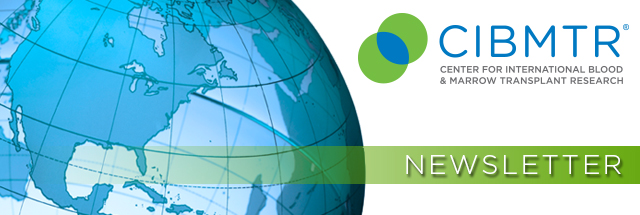
Volume 29, Issue 1
Table of Contents:
Perspectives: Singing in Harmony
By John Wingard, MD
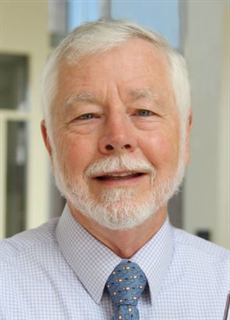
My folks insisted that I sing in the choir when I was a child. I never felt I was any good at it. They averred to the contrary. It was tolerable when I was in the chorus and my voice was lost among other stronger voices. However, the choir director occasionally roped me into a solo. Each time, I was embarrassed to my core.
To be clear, I love music. I did pretty well playing the French horn, and my times in band and orchestra are some of my fondest childhood memories. Always, part of an ensemble, not as a soloist.
In my adult life, my wife is quite blunt about my singing: John, you are not a good singer. My kids pile it on. Sadly, she cemented my belief, bringing me more misery thinking back on those awkward years, subjecting the congregation to my solos. But, she tolerates me joining in with the kids and grandkids singing along to the radio as we drive.
I recently participated in a transplant infectious disease symposium with a major focus on repurposing the “novel” immunomodulatory therapeutics we have been using for myeloma for years to tackle antibody-mediated solid organ graft rejection. My task was to offer insights into which infectious risks to expect. I hadn’t given any thought to this literature for more than a decade, and I read those early studies with fresh eyes. What I was struck by was the lack of uniformity in reporting infectious toxicities between trials. So much for evaluating so-called “precision” therapies with imprecise tools. The lack of consistency got in the way of making good sense of the risks.
For years, we had competing definitions of veno-occlusive disease: The Seattle criteria versus the Baltimore criteria. Why do some centers report high rates of thrombotic microangiopathy while others rarely see it?
Clearly, it is important to have a common language to describe the complications we encounter. Our industry partners will have no appetite to develop or test new therapies for HCT complications if we all cannot agree on common criteria that are accepted by all centers.
Fortunately, there are signs all around us that we appreciate the need for common toxicity definitions and standardized reporting, and we have made and are making substantial progress. The International Myeloma Workshop Consensus Panel developed a set of guidelines for uniform reporting of clinical trial results, first published in 2011 (1). More recently, testing of CAR-T therapies identified the unique cell therapy toxicities of cytokine release syndrome and neurological toxicities. Variable definitions of these toxicities in reports of different trials prompted an ASTCT panel to develop uniform, harmonized definitions of these toxicities (2). In 2018, a commission of patient advocates, clinicians, clinical investigators, regulators, biostatisticians, and pharmacists proposed near-term actions and long-term solutions in the assessment and reporting of adverse events, patient-reported outcomes, cellular therapy toxicities, long-term toxicity and survivorship, and issues in regulatory approval in hematological malignancies (3,4). The ASTCT, EBMT, and CIBMTR have convened working groups to develop harmonized definitions of BMT syndromes, now in progress. These are but a few examples. There are so many more.
There is an appetite for these efforts. I recently reviewed the lists of the most highly cited papers in the journal, Transplantation and Cellular Therapy. It should come as no surprise that many are group efforts for consensus guidelines, proceedings of workshops, harmonized definitions, etc.
Sadly, my parents were not right: I am not a good singer, a point my children remind me of every time I burst out singing at family gatherings. But I did have one crowning musical achievement: I played the French horn in Carnegie Hall—not as a soloist, but as a member of my college concert band. Playing harmony was my secret strength. So, too, our professional field’s secret strength is our collective willingness to come together to forge a common language to describe our treatments and complications, a path that is vital to accelerate research progress.
References
- Rajkumar SV, Harousseau JL, Durie B, et al. Consensus recommendations for the uniform reporting of clinical trials: Report of the International Myeloma Workshop Consensus Panel 1. Blood. 2011 May 5; 117(18):4691-4695. PMC3710442.
- Lee DW, Santomasso BD, Locke FL, et al. ASTCT consensus grading for cytokine release syndrome and neurologic toxicity associated with immune effector cells. Biology of Blood and Marrow Transplantation. 2019 Apr 1; 25(4):625-638. PMID 30592986.
- Thanarajasingam G, Minasian LM, Baron F, et al. Beyond maximum grade: Modernising the assessment and reporting of adverse events in haematological malignancies. Lancet Haematology. 2018 Nov 1; 5(11):e563-e598. PMC6261436.
- Thanarajasingam G, Minasian LM, Bhatnagar V, et al. Reaching beyond maximum grade: Progress and future directions for modernising the assessment and reporting of adverse events in haematological malignancies. Lancet Haematology. 2022 May 1; 9(5):e374-e384. PMC9241484.
2022 CIBMTR Annual Report
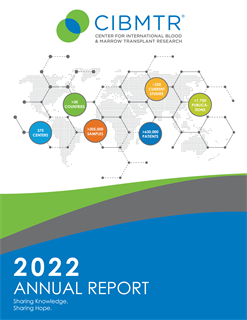 CIBMTR’s 2022 Annual Report is now available to view on the Administrative Reports webpage.
CIBMTR’s 2022 Annual Report is now available to view on the Administrative Reports webpage.
This document explains who we are, our strategy and impact, our 6 research programs, how we share knowledge, and how we manage data. 2022 accomplishments are highlighted throughout the report.
Thank you for helping us make 2022 another successful year!
Pick up your copy of the 2022 Annual Report at the 2023 Tandem Meetings. (Find CIBMTR's booth within the 2023 Tandem Meetings Hub.)
New CIBMTR.org Website Now Live!
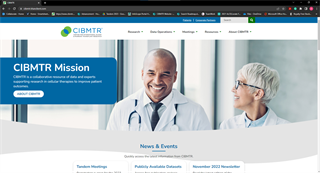 Our new CIBMTR.org website is now LIVE as of January 16, 2023!
Our new CIBMTR.org website is now LIVE as of January 16, 2023!
The new website offers you:
• Enhanced search function
• Filters for studies, publications, forms, etc.
• Optimization for viewing on all devices
• Reduced clicks when accessing crucial information
Please pardon our dust as we work through any issues that may arise with the new website.
Non-Malignant Diseases Working Committee
Committee Leadership
Co-Chairs:
- Christopher Dvorak, MD, University of California San Francisco Medical Center – Peds, San Francisco, CA
- Andrew Gennery, MD, Newcastle General Hospital / The Royal Victoria Infirmary, Newcastle, United Kingdom
- George Georges, MD, Fred Hutchinson Cancer Center, Seattle, WA
Scientific Director:
- Larisa Broglie, MD, MS, CIBMTR MCW
Statistical Director:
- Soyoung Kim, PhD, CIBMTR MCW
Statistician:
- Charimar Santiago Parrilla, MPH, CIBMTR MCW
The Non-Malignant Diseases Working Committee conducts clinical research on early and late outcomes following allogeneic HCT for these diseases. Many of the diseases are rare to ultra-rare with small patient populations, so the best avenue to collect maximum information about HCT outcomes for these diseases is to promote collaborative studies. This working committee collaborates with EBMT, Eurocord, and several individual highly specialized centers to report transplant-related topics and further the field of knowledge in this area. The disorders covered by the committee are broadly classified under the following categories: Marrow failure (acquired and inherited), hemoglobinopathies, metabolic disorders, immune deficiency / dysregulation disorders, and autoimmune diseases. The uniqueness of this working committee is that we manage a wide variety of different diseases. However, these diseases also have much in common. For example, many patients are young; therefore, the toxicities may be different from those seen in adults, and the potential to positively affect their lives is magnified.
In the last four years (2018-2021), the committee produced 13 peer-reviewed manuscripts. Three of the manuscripts focused on hemoglobinopathies, one in thalassemia and two in sickle cell disease. These studies addressed outcomes after transplantation, including matched and mismatched unrelated donors and mismatched related family donors, and they developed and validated a simple risk score for patients considering transplantation for sickle cell disease. We envision that HCT physicians will utilize this tool in their consultations with patients and their families. Two of the manuscripts concentrated on primary immunodeficiencies. One of the manuscripts was developed in collaboration with EBMT; it described the world's largest dataset on patients with DNA breakage repair disorders and established the risks of myeloablative conditioning in these patients. Conversely, a study in patients with hyperinflammatory inborn errors of immunity demonstrates a greater risk of graft rejection when reduced-intensity fludarabine-melphalan conditioning is utilized for these diseases.
Multiple studies are currently ongoing within the committee. We are conducting a study on long-term outcomes of autologous HCT for systemic sclerosis / scleroderma. Since two large, multicenter, randomized clinical trials established the superiority of autologous HCT over the standard of care chemotherapy, we are assessing the long-term status of systemic sclerosis patients after autologous HCT. In the past 2 decades, more than 123 patients with systemic sclerosis completed autologous HCT at 10 centers in the US and Canada. Patients were treated with either total body irradiation / cyclophosphamide / anti-thymocyte globulin or high-dose cyclophosphamide / anti-thymocyte globulin, with or without CD34+ selection. This study examines the long-term outcomes of systemic sclerosis patients followed for as many as 20 years after HCT. Other studies in process include evaluation of serotherapy approaches during transplantation for non-malignant diseases and outcomes for patients with hemophagocytic lymphohistiocytosis and Fanconi anemia. Additionally, an upcoming study will describe outcomes of patients with aplastic anemia who require a second HCT for graft failure.
Committee membership draws investigators from diverse backgrounds, each with experience in transplantation for benign, often rare disorders. The uniquely different disorders and the common transplant goals provide a great opportunity for synergy in scientific interactions and for members to bring forth new ideas. A full list of the studies undertaken by this committee, including recent publications, is provided on the Non-Malignant Diseases Working Committee studies webpage. Each year, one or two new proposals are selected during the Tandem Meetings. The selection process includes input from working committee members who score and prioritize studies based on interest and impact factors. We encourage active participation, the submission of new study proposals, and discussion with the chairs, as the success of the committee is highly dependent upon the scientific community. We also encourage the input of junior investigators. To learn more about our committee or to discuss ideas and new projects, please contact one of the committee chairs or the scientific director, or visit the Non-Malignant Diseases Working Committee webpage.
Donor Health and Safety Working Committee
Committee Leadership
Co-Chairs:
- Jack Hsu, MD, Shands HealthCare & University of Florida, Gainesville, FL
- Fotios Michelis, MD, PhD, (INCOMING CHAIR) Princess Margaret Cancer Center, Toronto, ON
- Sandhya Panch, MD, MPH, University of Washington, Seattle, WA
- Galen Switzer, PhD, University of Pittsburgh Medical Center - Cancer Center, Pittsburgh, PA
Scientific Director:
- Heather Stefanski, MD, PhD, CIBMTR NMDP
Statistical Director:
- Brent Logan, PhD, CIBMTR MCW
Statistician:
- Stephanie Bo-Subait, MPH, CIBMTR NMDP
For 16 years, the Donor Health and Safety Working Committee has studied unrelated and related hematopoietic stem cell donor characteristics and the impact of donation on these donors. Our diverse committee specializes in understanding stem cell biology, clinical effects / risks, psychosocial experiences, ethics, and policy decisions in the context of donors and donations. The primary goal of our research is to change / optimize clinical practice guidelines to improve donor safety, donation experiences, and outcomes.
Our recent key accomplishments include the completion of manuscripts in the areas of related donor health and safety; the effect of graft cryopreservation on recipient outcomes, particularly given the high use of cryopreservation during the COVID-19 pandemic; and the clinical impact of donor-recipient ABO incompatibility. We are currently studying toxicities following bone marrow donation in donors with sickle cell trait. We also initiated the writing process for a review article for donor-derived malignancy and donor selection prior to allogeneic HCT.
Establishment of Related Donor (RD) Safe, the first large prospective observational cohort of related donors provides an opportunity to examine the characteristics of related donors and compare them to those in unrelated donors of the CIBMTR registry. A notable example of an RDSafe study by Farhadfar and colleagues examined the impact of health-related quality of life on donation experiences and clinical markers, including stem cell yields. While psychological factors, including anxiety and depression, did not negatively impact stem cell yields, the study stressed the need to personalize information and intervention for specific donors based on perceived pain and other parameters. This study was published in Transplantation and Cell Therapy in 2022.
The most recent RDSafe study was conducted by Seftel and colleagues and focused on serious adverse events in related donors (2021 Tandem Meetings). This study identified a small (0.71%) but notable number of serious adverse events (0.71%) in related donors who were obese or overweight or had medical conditions that would have precluded donation by unrelated donor screening criteria. These findings are a critical first step to re-evaluating related donor medical suitability as an important consideration in the transplant process.
A retrospective analysis to understand the potential mechanisms underlying the clinical impact of ABO incompatibility on allogeneic transplant outcomes demonstrated that pre-transplant ABO status is an independent predictor of survival and other post-transplant outcomes in a large cohort of patients with AML and ALL undergoing allogeneic transplant in the recent era. The authors presented their findings at the 2021 American Society of Hematology Annual Meeting and noted the importance of considering ABO status in the donor selection algorithms and evaluating potential strategies to mitigate its adverse impact.
View planned, in-progress, and completed studies and publications on the Donor Health and Safety Working Committee webpage. We encourage participation from the donation and transplant community, especially new members, in ongoing studies or through the submission of new proposals in the areas of donor safety, donation characteristics, and impact on donors and recipients.
2023 Tandem Meetings
By Alicia Halfmann and Maira Brey
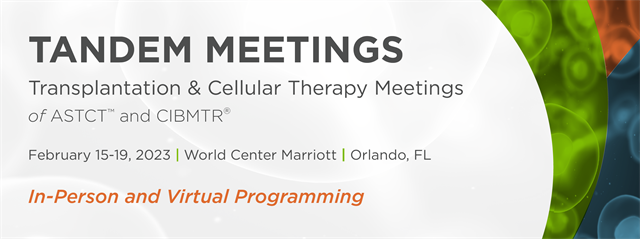
The Tandem Meetings | Transplantation & Cellular Therapy Meetings of ASTCT and CIBMTR (Tandem Meetings) are the combined annual meetings of the ASTCT and CIBMTR. Administrators, clinicians, data manager / clinical research professionals, fellows-in-training, investigators, laboratory technicians, MD / PhDs, nurses, nurse practitioners, pharmacists, physician assistants, and other allied health professional attendees benefit from a full scientific program that addresses the most pressing issues in HCT and cellular therapy.
Join us in person or virtually for the 2023 Tandem Meetings, February 15-19, 2023, at the World Center Marriott in Orlando, Florida.
Ways To Attend
Similar to the 2022 Tandem Meetings last April, we are excited to provide the opportunity to meet in person and for those unable to travel, virtual options are available. All registered attendees will have access to view recordings at their leisure post-meetings.
Register and Book Housing Now
Navigate to the 2023 Tandem Meetings website to register and view additional details. After registering, if you plan to join us in person, take advantage of special conference guest room rates offered at several hotels in the 2023 Tandem Meetings housing block. All hotels within the block are located within 4 miles of the 2023 Tandem Meetings venue.
A Program You Won’t Want to Miss
Leading global experts in the field of transplantation and cellular therapy will present the latest developments through 6 plenary sessions, 9 concurrent sessions, 16 oral abstract sessions, Meet-the-Professor sessions, ASTCT Spotlight Sessions, and CIBMTR Working Committee meetings.
Please join us Friday, February 17, for the honorific lectures as Katharina Fleischhauer, MD, presents the Mortimer M. Bortin Lecture: “Exploiting HLA to Improve Patient Outcomes: Lessons Learned During Half a Century of Transplant Practice” and Leslie Kean, PhD, presents the E. Donnall Thomas Lecture: “Targeting GVHD: From the Bench, to the Bedside, to the FDA”. We also invite you to join us as the CIBMTR Distinguished Service Award is presented to J. Alejandro Madrigal, MD, PhD, DSc, on Saturday evening. Following the 2023 Tandem Meetings Awards Ceremony, you won’t want to miss the 2023 Tandem Meetings Closing Reception, which will be an enjoyable evening celebrating the 2023 Tandem Meetings with conversation, cuisine, and dancing.
In addition to an outstanding scientific program, the 2023 Tandem Meetings offers parallel tracks for pharmacists, center administrators, coordinators, investigators, medical directors, clinical research professionals / data managers, transplant nurses, information technology professionals, and advanced practice professionals. Along with state-of-the-art educational offerings, industry-supported satellite symposia and product and innovation theaters will broaden the presentation spectrum.
Networking Opportunities
Networking opportunities offered during the 2023 Tandem Meetings include the 2023 Tandem Meetings Welcome Reception on Wednesday evening, the Poster Reception: Meet the Authors on Thursday evening, the 2023 Tandem Meetings Closing Reception on Saturday evening, and more.
The 2023 Tandem Meetings are a live event with virtual components. All registered attendees receive access to the following components:
• Live streamed sessions and on-demand sessions: Scientific plenary and concurrent sessions, oral abstract sessions, Friday general sessions, symposia, and educational tracks
• Continuing education credits for up to 30 days post meetings after viewing live-streamed sessions and / or session recordings
• Session recordings after the 2023 Tandem Meetings conclude
• Networking with attendees and speakers via the mobile app
• Access to posters via the mobile app
Plan Your Week in Advance of the Meetings
The 2023 Tandem Meetings agenda is available on the 2023 Tandem Meetings website. You can search the agenda by day or by track. Be sure to log in using your last name and registration number to complete your attendee profile before building your personal agenda.
2023 Tandem Meetings on Mobile!
Prior to the start of the 2023 Tandem Meetings, you will be able to download the official 2023 Tandem Meetings mobile app for quick and easy access to the most current version of the schedule, venue information, and more! If you already created a personalized schedule within the online version of the app, it will transfer to your mobile app. Watch for additional details coming via email in February 2023.
The app is free for all attendees, and with wi-fi available throughout all 2023 Tandem Meetings rooms, users can:
• View the times and locations of sessions and networking events
• Build your personal agenda
• Create your attendee profile
• Send messages and meeting requests to other attendees
• Explore interactive maps of the World Center Marriott
• Participate in live polling during sessions and much more!
Support Opportunities and Additional Information
Questions regarding support opportunities at the 2023 Tandem Meetings of ASTCT & CIBMTR may be directed to the Tandem Meetings Conference Office: TandemMeetings@mcw.edu.
We look forward to seeing you in Orlando, Florida!
Join the Conversation: #Tandem23
Health Services Research Program at the 2023 Tandem Meetings
By Jaime Preussler, Christa Meyer, Rafeek Yusuf
The Health Services Research program conducts studies in multiple focus areas, including disparities, barriers to access, and quality of life. Four studies involving the Health Services Research team will be presented at the 2023 Tandem Meetings. Studies include:
| Study | Poster # | Date / Time |
|---|---|---|
| Can you spare 100 days? The allogeneic hematopoietic cell transplant caregiver requirement describes the results of a qualitative study to learn more about caregiver requirements from the perspective of social workers. | Poster 473 | Thursday, February 16, 5:45-6:45 PM |
| Can you spare 100 days? Allogeneic hematopoietic cell transplant caregiver requirements from the perspective of recipients and caregivers describes results from the perspectives of patients and caregivers. | Poster 470 | Thursday, February 16, 5:45-6:45 PM |
| Impact of public reporting of Center-Specific Analysis Scores on hematopoietic cell transplant center volumes” highlights research evaluating the impact of CIBMTR’s Center Specific Survival Analysis on transplant center volumes. The Health Services Research team collaborated with other CIBMTR teams and multiple stakeholders, determining that volume was impacted by lower scores in prior years. | Poster 235 | Thursday, February 16, 5:45-6:45 PM |
| Patient-reported outcomes in long-term survivors of autologous hematopoietic cell transplantation for Hodgkin and non-Hodgkin lymphoma: Secondary analysis from two multicenter randomized controlled trials of hematopoietic cell transplant survivorship interventions provides results of a secondary analysis of HCT survivors 1 year to 10 years post-transplant to assess health-related quality of life. Results showed survivors with Hodgkin lymphoma and non-Hodgkin lymphoma who received autologous HCT had a lower physical health-related quality of life and similar mental health-related quality of life compared to the general population. | Poster 493 | Thursday, February 16, 5:45-6:45 PM |
Further information on these studies will be presented via posters at the 2023 Tandem Meetings.
For more information about the Health Services Research Program, visit the Health Services Research webpage or email Rafeek Yusuf, PhD, Director, Health Services Research.
ACCESS Clinical Trial
The ongoing NMDP-sponsored ACCESS trial being conducted by CIBMTR has now been open to enrollment for 16 months. ACCESS is assessing outcomes from transplantation of a PBSC or bone marrow product from an HLA-mismatched, unrelated donor using post-transplant cyclophosphamide-based GVHD prophylaxis.
Since the study opened, the ACCESS trial has enrolled 142 adults and 6 children. Adult accrual has far surpassed the projected rate, as it is currently at 160% of the projected enrollment for this time period. Thirty-five study sites are active and open to enrollment, and 24 of these sites have enrolled at least one or more subjects. Importantly, 47% of currently enrolled subjects are racially and / or ethnically diverse.
The brisk accrual and broad site participation suggests ACCESS addresses an unmet patient need. Therefore, we are excited to share that NMDP has granted the study additional funding to extend access to this trial to an additional 100 subjects. A protocol amendment is in progress, and we expect to be able to re-open enrollment early in 2023.
Investigators recently presented the ACCESS trial as a “Trials-In-Progress” poster presentation at the 2022 ASH Annual Meeting (1). The study will convene a meeting of site investigators and present a poster abstract at the 2023 Tandem Meetings.
Reference
- Al Malki MM, Devine SM, Shaw BE, et al. ACCESS: A multi-center, Phase II trial of HLA-mismatched unrelated donor hematopoietic cell transplantation with post-transplantation cyclophosphamide for patients with hematologic malignancies. Blood (2022) 140 (Supplement 1): 7591–7593. DOI: 10.1182/blood-2022-162581.
BMT CTN at the 2023 Tandem Meetings
By Mykala Heuer, BSN, RN
BMT CTN Leadership
The BMT CTN Steering Committee continues under the leadership of Edward Stadtmauer, MD, (University of Pennsylvania) as Chair and John Levine, MD (Mount Sinai) as Chair-Elect. Stephanie Lee, MD (Fred Hutchinson Cancer Center) started her term as Vice Chair on January 1.
See you at the 2023 Tandem Meetings!
The BMT CTN Coordinators Meeting is scheduled for Wednesday, February 15, 8:30 AM-4:15 PM in the Crystal H room. This meeting can also be attended virtually. The meeting will cover BMT CTN processes and study overviews and, as always, will feature presentations from several BMT CTN investigators. We hope to see all the BMT CTN study coordinators there in person or virtually!
The BMT CTN Multiple Myeloma Intergroup Meeting is scheduled for Thursday, February 16, 6:30-8:30 AM in the Canary 1 room. Please note, this meeting requires an RSVP prior to attending. For more information regarding attendance, contact Jana Pavel (jpavel@nmdp.org).
Don’t miss the two BMT CTN Poster Abstracts that will be presented on Thursday, February 16, 5:45-6:45 PM
• BMT CTN 0702 (STaMINA Myeloma) presented by Ehsan Malek, MD
• Patient and Caregiver Advocacy Task Force presented by Sumithira Vasu, MBBS
Also, please stop by the BMT CTN booth – BMT CTN investigators and Data and Coordinating Center staff will be available during breaks to answer your questions and provide ideas for how your center can get involved.
BMT CTN Publications
To date, there are 150 BMT CTN published articles, including 38 primary analyses. The following primary results papers were recently published:
- DeZern et al. Haploidentical bone marrow transplantation in patients with relapsed or refractory severe aplastic anaemia in the USA (BMT CTN 1502): A multicentre, single-arm, Phase II trial. Lancet Haematology. 2022 Jul 27.
https://www.ncbi.nlm.nih.gov/pubmed/35907408 - Bashir et al. A multicenter Phase II, double-blind, placebo-controlled trial of maintenance Ixazomib after allogeneic transplantation for high-risk multiple myeloma: Results of the Blood and Marrow Transplant Clinical Trials Network 1302 trial. Transplantation and Cellular Therapy. 2022 Jul 12.
https://www.ncbi.nlm.nih.gov/pubmed/35840087 - Richardson et al. Triplet therapy, transplantation, and maintenance until progression in myeloma. New England Journal of Medicine. 2022 Jun 05.
https://www.ncbi.nlm.nih.gov/pubmed/35660812
About the BMT CTN
CIBMTR shares administration of the BMT CTN Data and Coordinating Center with NMDP/Be The Match and The Emmes Company. Together, these three organizations support all BMT CTN activities.
To get up-to-date information about BMT CTN studies, meetings, and news:
- Follow us on Twitter: @BMTCTN
CIBMTR Portal Application and Report Updates
The close of the calendar year always includes a significant number of updates for the portal applications (https://portal.cibmtr.org). This year we updated the data sets for both the Center Performance Analytics application and the Survival Calculator application. In addition to updating data sets, we also published several annual reports and made them available on the portal. Reports include Center-Specific Survival Analysis reports, univariant reports, and CPI memos.
Center Performance Analytics is a tool that enables centers to utilize a high-quality data set to analyze their own center's one-year survival rate and comparatively analyze their center's data relative to other center data (in aggregate) within the data chosen for the selected dimensions. This data set was updated in December 2022 and reflects the current trends at participating transplant centers.
The survival calculator uses aggregated data from US HCT centers to provide an estimate of one-year survival for patients for whom a first allogeneic HCT is planned. The Survival Calculator data set was updated in December 2022. In addition to an updated data set, CIBMTR is introducing a Survival Calculator with an improved look and feel that will be expanded on in future releases.
Center-Specific Survival Analysis and univariant reports are updated annually at the end of each year and sent to participating transplant centers. An archive of your center’s current and past reports can be found on the portal in the Data Ops Dashboard under the TCSA (Transplant Center Specific Analysis) tab.
Current and historical CPI memos are also available on the Data Ops Dashboard under the CPI tab. The CPI program supports collaborative research to increase access to and improves outcomes of all cellular therapies. Additionally, the CPI program supports the ability to perform benchmarking and provide accurate population-level data. These data are also used to support quality assurance efforts for the programs providing the products, including cord blood banks as well as apheresis and collection centers.
Share Your Research in Plain Language
By Jennifer Motl
These new plain-language summaries of CIBMTR research may help your patients:
 |
People who get BMT for multiple myeloma have good quality of life Read more: |
 |
Most older people who have AML benefit from transplant Read more: |
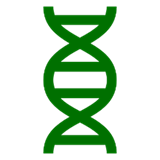 |
Race, genes, and other things affect how well BMT work Read more: |
 |
Half-matched transplant helps people with aplastic anemia Read more: |
 |
For multiple myeloma, BMT is an option Read more: |
Find more summaries on the Study Summaries for Patients webpage.
Publicly Available Datasets
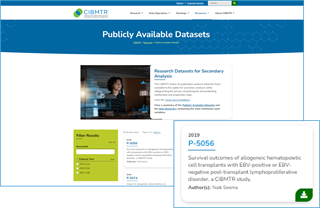 UPDATED: View a summary of the Publicly Available Datasets and the data dictionary containing the most commonly used variables.
UPDATED: View a summary of the Publicly Available Datasets and the data dictionary containing the most commonly used variables.
In accordance with the NIH Data Sharing Policy and NCI Cancer Moonshot Public Access and Data Sharing Policy, CIBMTR makes the final datasets from published studies publicly available on CIBMTR’s Research Datasets for Secondary Analysis webpage. These publication analysis datasets are freely available to the public for secondary analysis.
While providing these data, CIBMTR is committed to safeguarding the privacy of participants and protecting confidential and proprietary data. Upon accessing the datasets page on CIBMTR’s public website, the viewer is notified that the dataset was collected by CIBMTR, and CIBMTR’s supporters are listed. The webpage also clearly notes the terms and conditions of dataset usage.
NEW datasets are now available online.
Our Supporters
CIBMTR is supported primarily by Public Health Service U24CA076518 from the National Cancer Institute (NCI), the National Heart, Lung and Blood Institute (NHLBI) and the National Institute of Allergy and Infectious Diseases (NIAID); U24HL138660 and U24HL157560 from NHLBI and NCI; U24CA233032 from the NCI; OT3HL147741 from the NHLBI; HHSH250201700006C, 75R60222C00008 and 75R60222C00009 from the Health Resources and Services Administration (HRSA); and N00014-21-1-2954 and N00014-23-1-2057 from the Office of Naval Research.
Additional federal support is provided by P01CA111412, R01CA100019, R01CA152108, R01CA218285, R01CA231141, R01CA231838, R01CA262899, R01AI128775, R01AI150999, R01AI158861, R01HL155741, R01HL131731, UM1CA121947, U01AI069197, U01AI126612, UG1HL069254.
Support is also provided by Be The Match Foundation; Boston Children’s Hospital; Dana Farber; St. Baldrick’s Foundation; PBMTF; Stanford University; Medical College of Wisconsin; National Marrow Donor Program; and from the following commercial entities: AbbVie; Actinium Pharmaceuticals, Inc.; Adaptimmune; Adaptive Biotechnologies Corporation; ADC Therapeutics; Adienne SA; Allogene; Allovir, Inc.; Amgen, Inc.; Angiocrine; Anthem; Astellas Pharma US; AstraZeneca; Atara Biotherapeutics; BeiGene; bluebird bio, inc.; Bristol Myers Squibb Co.; CareDx Inc.; CRISPR; CSL Behring; CytoSen Therapeutics, Inc.; Eurofins Viracor, DBA Eurofins Transplant Diagnostics; Gamida-Cell, Ltd.; Gilead; GlaxoSmithKline; HistoGenetics; Incyte Corporation; Iovance; Janssen Research & Development, LLC; Janssen/Johnson & Johnson; Jasper Therapeutics; Jazz Pharmaceuticals, Inc.; Kadmon; Karius; Kiadis Pharma; Kite, a Gilead Company; Kyowa Kirin; Legend Biotech; Magenta Therapeutics; Mallinckrodt Pharmaceuticals; Medexus Pharma; Merck & Co.; Mesoblast; Millennium, the Takeda Oncology Co.; Miltenyi Biotec, Inc.; MorphoSys; Novartis Pharmaceuticals Corporation; Omeros Corporation; OptumHealth; Orca Biosystems, Inc.; Ossium Health, Inc.; Pfizer, Inc.; Pharmacyclics, LLC, An AbbVie Company; Pluristem; PPD Development, LP; Sanofi; Sanofi-Aventis U.S. Inc.; Sobi, Inc.; Stemcyte; Takeda Pharmaceuticals; Talaris Therapeutics; Terumo Blood and Cell Technologies; TG Therapeutics; Vertex Pharmaceuticals; Vor Biopharma Inc.; Xenikos BV.
